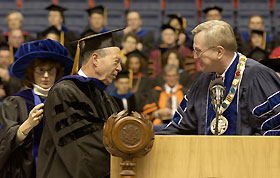Commencement
Speaker Urges Winter Grads
To Be Informed Citizens
 |
|
Aryeh Neier, center, president of the Open Society Institute, is congratulated on his honorary degree by President Philip E. Austin, as Professor Sally Reis arranges the hood during the Commencement ceremony Dec. 19. |
|
Photo by Peter Morenus
|
Exercise your right to vote; read the newspaper; and fulfill your civic responsibility. That’s the message human rights expert Aryeh Neier gave to students in his commencement address at Gampel Pavilion Dec. 19.
“As informed citizens, you will help steer this country on the right course,” said Neier, president of the Open Society Institute, a private grant-making foundation that is the hub of the Soros Foundations network.
Nearly 500 graduating students were joined by about 3,500 friends and family members at UConn’s second winter commencement. In 2003, the midyear graduation took place in Jorgensen Center for the Performing Arts. An increase in the number of students eligible to graduate in December prompted UConn officials to move the 2004 ceremony to Gampel. More than 760 students received their diplomas at the end of last semester, although not all of them attended the ceremony.
Keith Barker, University Marshal, said about 25 percent of graduates were from the regional campuses; half of those were from the Stamford campus.
Barker said students were delighted that there was no limit on the number of guests they could invite. One student, he noted, had about 20 family members “cheering him on.” The Perfect Fifth Brass Quintet, student musicians from the School of Fine Arts, played during the event.
Neier said both President Bush and former U.S. presidents have embraced the commitment to promote freedom and democracy around the world. But in the struggle to do so, the United States is “handicapped by the widespread perception in many parts of the world that we have abandoned those principles when it comes to our own conduct.” He cited the long-term detentions without charges or trial at Guantanamo, Cuba, and the revelation that the U.S. used torture at Abu Ghraib prison in Iraq.
“To some, in the Middle East in particular, the picture of a hooded figure standing on a cardboard box with wires attached to sensitive parts of his body may have replaced the Statue of Liberty as a symbol of the United States,” he said.
Neier, who was given an honorary Doctor of Laws degree during the ceremony, said the United States “can only succeed in promoting freedom and democracy internationally if we restore our reputation for meeting the standards we extol.” He said the world “depends on each of us exercising our responsibility – that is, the President’s responsibility, my responsibility, and your responsibility – to live by the values we seek to export.”
Neier spent 12 years as executive director of Human Rights Watch, of which he was a founder in 1978. Prior to that, he worked for the American Civil Liberties Union for 15 years, including eight as national executive director. He was an adjunct professor of law at New York University from 1978 to 1991.
Born in Nazi Germany, Neier became a refugee at an early age. He has conducted investigations of human rights abuses in more than 40 countries around the world and, for more than two decades, has been promoting compliance with international humanitarian law.
Katie Boiteau, an honors scholar who graduated with a degree in ecology and evolutionary biology, represented the graduating class. She said UConn is a “little big university where I learned how to learn.”

